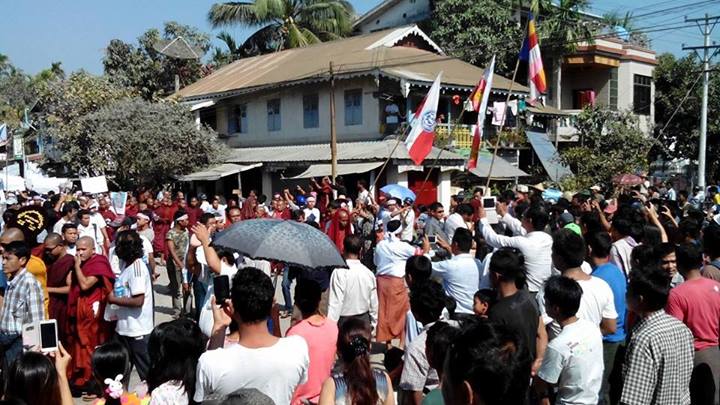Some 3,000 local residents took to the streets of Arakan State capital Sittwe on Monday to voice their support for the regional police and to protest against rights for the Rohingya community and international organisations that they allege are biased in support of Muslims.
The demonstration, led by nationalist group Rakhine Social Network, was joined by Arakanese Buddhist residents and monks who chanted slogans and held placards. Their demands included: abolish voting rights for Rohingya “white card” holders (ie: non-Burmese citizens); the withdrawal from the area of the UN, Médecins Sans Frontières (MSF) and other international relief groups; and for Arakanese police to be granted the right to use lethal force in “emergency situations”.
“We would like to have the police armed with better and more modern weapons so they can defend themselves more effectively,” said Nyo Aye, one of the protest organisers. “We are also demanding that the police be given 100 percent authority to shoot at their own discretion.”
With regard to the UN and international aid groups, protestors called for their expulsion for allegedly offering “biased assistance” in terms of relief supplies to Rohingya Muslims as opposed to Arakanese Buddhists.
Some demonstrators carried placards which called for the closure of UN and MSF offices “within seven days” for “feeding Bengalis [Rohingyas]”.
Neither the UN’s Office for the Coordination of Humanitarian Affairs (OCHA) nor MSF were available for comment when contacted by DVB. *
[related]
Protest organiser Nyo Aye said the rally was staged with the approval of the local authorities, and that similar protests are planned for other towns in Arakan State, including Mrauk-U, Kyauktaw, Minbya and Maungdaw.
Meanwhile, DVB has been told by several sources in Sittwe that dozens of Rohingya families have left their homes and headed to IDP camps or to stay with relatives in other towns in fear of violence in the wake of recent incidents 100km north in Maungdaw.
Last month the UN announced it had found “credible evidence” that at least 48 Rohingya men, women and children were killed in the village of Duchira Dan [also written Du Char Yar Tan] in Maungdaw Township by Arakanese Buddhists. A local police officer is also alleged to have been killed by a mob of Rohingyas.
Since then, fear and tension has spread south. In the closed-off barrio of Aung Mingalar, the last remaining Rohingya neighbourhood in downtown Sittwe, several Muslim residents said they were contemplating evacuating or had sent family members away in case of renewed anti-Muslim rioting.
Gani Ahmed, who owns a teashop in nearby Bumay District, said he sent his two sons to an IDP camp because of rumours of more violence. He added that other people have left Bumay since the incidents on 13 January and 28 January in Maungdaw, and that fewer customers were frequenting his teashop.
Some spoke of selling their belongings to afford the short trip to the camps. Yusouf Ali said he moved from his home in Aung Mingalar to the Rubber Garden IDP Camp where he met up with several other Aung Mingalar neighbours.
“We came here for two reasons,” he told a DVB reporter. “One is because we fear for our lives since the killings in Maungdaw. The other is because life has become unsustainable in Aung Mingalar and people have no jobs and no money.”
Noor Mohamed, the chairman of the Rubber Garden camp, said that he thinks at least 25 people are now arriving every day to shelter at the camp, and that many cite fear of more violence as the reason.
Phil Robertson, deputy director of the Asia division for Human Rights Watch, told DVB that Aung Mingalar is “surrounded by hostile Rakhine [Arakanese] who have made clear their intention to push the Rohingya out.”
However, a central committee member for the Rakhine Nationalities Development Party, Shwe Maung, denied that there have been any threats against the Rohingyas. “We are peaceful people,” he told DVB.
He suggested that “the Bengalis may have left their homes because they feared being discovered as illegal immigrants amid the increased security presence in Sittwe following the Maungdaw violence.”
* In original version of this article, DVB said neither OCHA nor MSF “would comment” on the accusations. In fact, neither organisation refused to comment, and their responses have now been noted in our 5 February article. DVB apologises to OCHA and MSF for any any misdirection caused by this quote.
Reporting in Sittwe for DVB by Joshua Carroll



